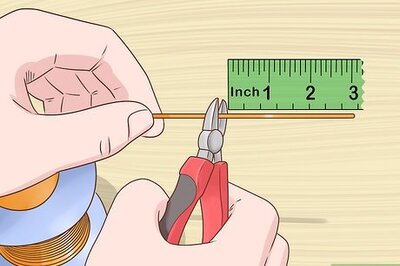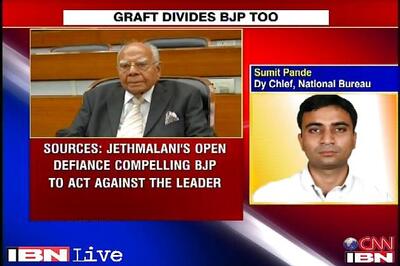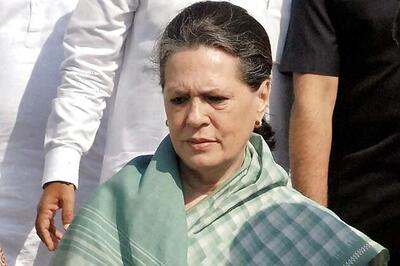
views
Sagarika Ghose: Hi there, good evening, yes today is International Day of Older Persons and we're focusing tonight on a disturbing new study which says that one in three elderly persons in India is physically and verbally abused by their own children. The primary perpetrator of this abuse is the son. What explains the rise in abuse of elderly parents? Let's get you the findings of the study and then hear from our panelists. So on International Day for Older Persons, we're asking, why are the elderly being abused by their own children? Let's talk in the first part of the programme about why this is happening and in the second we'll talk about possible solutions. Joining us tonight, Mathew Cherian, CEO, HelpAge India, BR Sahani, Senior Citizen, Adab Singh Kapoor, Supreme Court lawyer, Akhila Sivadas, Director, Centre for Advocacy and Research, someone who is the part of the Pension Parishad which launched an agitation to ask for a universal pension for the poor elderly believing that self sufficiency is the way to guarantee dignity.
Let come to you MC, very horrific findings in this study that one in three elderly are abused by their own children. In 56 per cent cases the sons are the primary perpetrator. Why is this happening? What are the reasons for this?
Mathew Cherian: There are many reasons, one is the huge population explosion of the elderly. Today we have 100 million elderly. The census also say that the family size has dropped from 5.1. This is a city survey, it was done in over 20 cities, and in cities bulk of the cases were over property. So the children want the property before the parents die. In the past they used to wait for the will of the father after he passes away. Now children want it quick before he dies. And the only way to do this is through abuse and ejecting the family out...
Sagarika Ghose: Ejecting the parents out?
Mathew Cherian: Ejecting the parents out, and after that they get into an old age home and then they can have the property. Primarily this has been the factor.
Sagarika Ghose: It's property. But could it also be urban living, the stresses and strains of urban living? Often a young couple can't adjust to an elderly person. It's not necessarily abuse, it's misunderstanding. Could it possibly be there?
Mathew Cherian: Urban pressure is there, we have found cases in which they have told the parents to live in the store rooms while the rest of the family lives in the bedrooms. In some parts of Delhi I have seen people spending their time in the balcony, they are not even allowed into the house. They are living their entire life in the balcony rather than the house.
Sagarika Ghose: It is not family pressure or misunderstanding, it is straight forward abuse. Mr BR Sahani, you are with us, you now live in an old age home, please tell us what happened with you? You told in our story that you son slapped you, you daughter-in-law said they won’t give you food. What happened with you?
BR Sahani First, my child's work was a lot, he started drinking for not having work then. Secondly, he used to drink and used to say that I am a big responsibility on him. So they didn't use to treat me well. They said few things which I couldn't take and then I have a daughter who looks after me very well. I called her up and told her about all this. I am talking about my middle son. So then I went to live with my youngest son and his wife said that you sleep in front of the temple and then think in the morning where you have to go.
Sagarika Ghose: Mr Sahani I want to ask you if this happened because of the property disputes, they wanted the property?
BR Sahani No, no, it didn't happen because of the property. I bought I plot in Noida...
Sagarika Ghose: Did you name the property to them?
BR Sahani No, but they made me sold the property. And then lastly I got a flat in Rohini, society, so I said lets go there as now my wife is not there, she is dead, they said what will do there?
Sagarika Ghose: So basically what happened with you is that they ejected you from the house and now you live in a old age home?
BR Sahani Yes.
Sagarika Ghose: Is this what happens Adab Singh Kapoor, to most elderly that their son throw them out of their home because they don't want to keep them? Is it because of the property related issues?
Adab Singh Kapoor: See the bone of contention is property in most of the case. Now, the same thing would not have happened to him, had he had property with him.
Sagarika Ghose: If he had property in his own name.
Adab Singh Kapoor: If he had the property his children wouldn't have dared to disown him and say that go to an old age home. Because he lost all his property they said whatever they wanted to say to him. From the experience of handling these cases I find the property the bone of contention. You have the children who wants the elder to will the property or give the property. And also they want the other sibling not to get anything and they pressurise the parent. So when this happens after that the parent have no property left with them and then they are abused.
Sagarika Ghose: But what explain the physical abuse? If it is about the property why not sort it out in court and challenge the property in the court?
Adab Singh Kapoor: See the property, the elderly have the property with them, now the five children, three children now wants the property. So once they get hold of the property then they feel that they have other use left in the world and then the abuse starts.
Sagarika Ghose: So it is a breakdown of the family, it is the ultimate breakdown of the love, compassion. It has all boiled down to a materialistic relationship. Let me get in Akhila Sivadas, Akhila you were in the Pension Parishad, you were advocating the universal pension for the elderly, as you rightly pointed out that time that the elderly needs that Rs 2,000 pension in order to lead that dignified life. Do you believe that it is pension, it is the economic self sufficiency that guarantees old age dignity?
Akhila Sivadas: No, I think we need to take in consideration the fact that the kind of people rallying around the pension are the people firstly in the informal sector and secondly they have worked their bone hard all their life and so now it is payback. They have sustained all the economic activities you know, they are the engines of work and growth. And I think pension is partly the fact that they need recognisation that they should be given security in their old age.
Sagarika Ghose: Let me come to you Mathew Cherian and pick the fact the elderly should be given security is it because the family is completely broken down, all the bonds have been completely broken down?
Mathew Cherian: You see we have presented this report to the President of India. This report says that the country is not investing in the social security. Less then 100 days of employment is available in India and these people don't have enough time to save for them. At the same time in the old age when you don't have pension, you don't have provident fund then it is a misery in the old age. As a result they fall prey to abuse.
Sagarika Ghose: Is there no mentality you don't have a pension because you think that the children will look after you. The son will look after them. Is it still a common perception? Because it is the sons who are turning around and not looking after them.
Adab Singh Kapoor: Well that is true but the elderly are also very sensible these days. They know that they should have the property, they should keep the property because they also know that they can’t trust their children anymore.
Sagarika Ghose: Mr Sahani, if you had the property in your name, do you think they would have treated you the same way?
BR Sahani: No, then they would have been with me and honour me. Still my eldest son calls me, loves me, but I don't know where he lives.
Sagarika Ghose: He doesn't want to meet you?
BR Sahani: No, he meets, his children meets, but his wife she doesn't meet. She doesn't even want to call her to their home. And my son who had hit me, he has died and I went to his home after three-four years when he died. Now my daughter-in-law has got her daughter married and she has gone to my son-in-laws and he said I cannot come until the elderly of the house comes.
Sagarika Ghose: But the daughter-in-law didn't come to you.
Adab Singh Kapoor: I just want to point out the issue of daughter-in-laws, the daughter-in-laws of the family implicate these kind of cases. Now this entire family has to go to this CAW cell, there are lengthy proceedings, then they have to anticipatory bail, then another bail. So there is so much hassle and then eventually the case settle down. But prior to the settling down of the case there is so much anxiety crushing the elderly.
Sagarika Ghose: Do you go along with that, that there are 498 cases brought against the elderly people?
Mathew Cherian: No, 498 cases are there, false allegations are there, our research says 53 per cent of the time son is the primary abuser. Twenty-three per cent of the time it is the daughter-in-law.
Sagarika Ghose: Fifty-three per cent of the time it is son.
Mathew Cherian: Fifty-six per cent. And very often the serials portray that the daughter-in-law is the main accuse.
Sagarika Ghose: Fifty-six per cent because the elderly stay with the son. The son abuses, the daughter-in-law maybe also supporting. At the same time it is the son who commits the verbal abuse, the physical abuse. And there is an interesting finding here that 55 per cent elderly don't report these cases.
Mathew Cherian: Yes. Reporting are always to relative, close relative and to some close friends whom they can trust. There is never a report to the outside agency.
Sagarika Ghose: Why is that?
Mathew Cherian: See, there is this family honour, family respect which is to be protected. Even in HelpAge they don't tell their cases. In many cases they reconcile themselves.
Sagarika Ghose: So there is no culture of going to an agency, going outside and complaining?
Mathew Cherian: No, nothing like that.
Adab Singh Kapoor: They don't come to the lawyers directly that's why they rather go to institutions like HelpAge. Yesterday I got a case where the father was really abused by his son, but the father said that I just want him to become alright. I gave him advise that file a complaint etc etc but he said ultimately he is my son.
Sagarika Ghose: They don't want to talk publicly. Mr Sahani, right now you live in the old age home, would you like to go back they call you?
BR Sahani: No, I would not like to go. Because all the grand children have now grown up so what will I do over there, here I have 24 brothers, sisters. And I have seen that an old person cannot spend his time at home. You were saying earlier that right now you are in heaven and would not like to go to hell.
BR Sahani: Absolutely, I am in heaven and would not like to go back. Then again the same things will be repeated. I must say that every house should have a daughter. My daughter still looks after me, my medicine and all.
Sagarika Ghose: Right, that is a very poignant statement that Mr Sahani is making that in a culture that worships the sons, his three sons did not look after him, one of them hit him, they threw him out of the house but now it is his daughter who is now looking after him. Let's get you some feedback that has come on the twitter CP Chindia write, with the western culture engulfing the Indian lifestyle like has become cruel for the elderly. And on IBNLive we also have some feedback, with growth in nuclear families, older people will be increasingly isolated. Let me come to you with the number of elderly, 350 million will be there by 2050. 88 million where there in 2009. Big numbers, we are not a young country, we are a rapidly aging country. So given the situation do you think we need much more infrastructure, I know your organization is doing a great job. What would you say be the basic infrastructural needs?
Mathew Cherian: The basic infrastructure need we need is the social infrastructure need. Which is health insurance for all, pension system for all and we also need a system by which communicating with our children about values.
Sagarika Ghose: Health infrastructure, pension and communication with the next generation. Akhila Sivadas, there is of course the PFRDA bill which is there, do you believe that will which help people to incentives them for there old age or do you believe that it has to be the state which has to give this pension of Rs 2,000 per month.
Akhila Sivadas: No, it primarily has to be the state, you are dealing with the very vulnerable section of the community, you are dealing with 55 per cent or more of that being women and most of them being widowed early, being forced into destitution early.
Sagarika Ghose: But the government says it is going to cost Rs two lakh crore per annum to have this universal pension.
Akhila Sivadas: No, no there are many ways of raising that money, money is the big bogey. But it can't be so exaggerated so as to abandon the whole section of the people. You are talking about aging society, large parts of India are soon going to face that problem and we know the level of abuse that is going on and we also know the cycle of abuse.
Sagarika Ghose: It is vicious cycle of abuse. Let me get you in here the reality is that the families are breaking down, we need many more old age homes, service for the poor, elderly. Do we need a whole range of infrastructure?
Adab Singh Kapoor: We have this Maintanance of Parents and Citizens Act 2007
Sagarika Ghose: Maintanance of Parents and Citizens Bill, we have information on that I am going to ask my producer to bring that up.
Adab Singh Kapoor: So they have provided the old age facilities and welfare facilities.
Sagarika Ghose: They have provided?
Adab Singh Kapoor: They have provided. Implementation is the key.
Mathew Cherian: They provided this for district, and they provided this for 626 districts but the Planning Commission haven't given any money so none of the old age homes have been built in these 626 districts.
Sagarika Ghose: Somebody has told me on Twitter that the elderly are not the vote bank so that's why they still haven't built it.




















Comments
0 comment